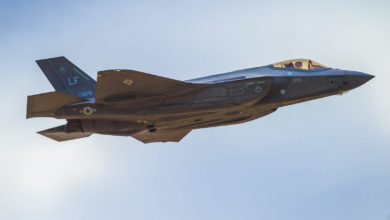Turkey receives F-35s from Lockheed, despite US Senate ban
Lockheed Martin held a roll-out ceremony for the delivery of two F-35s to Turkey on Thursday, June 21, despite a ban on the export of the stealthy joint strike fighter to America’s NATO ally.
However, the aircraft will not yet leave the United States. “The two jets will follow-on to Luke Air Force Base in Arizona at a later date,” Pentagon spokesperson Lieutenant Colonel Mike Andrews said on Tuesday, adding that Turkish pilots and maintainers have already arrived at Luke and “will begin flight academics soon.”
At the ceremony, General Reha Ufuk Er highlighted Turkey’s utility for NATO.
“F-35 is set to become the major strike aircraft of the Turkish airforce,” he said, Rudaw reported. “As being the bulwark on the alliance’s southern flank, Turkey’s strengthening airpower will significantly augment the alliance’s air capabilities and contribute greatly to regional and global stability.”
Anadolu news agency reported that Turkey’s F-35s will be deployed in the eastern Malatya province at the 7th Main Jet Base Command.
Turkey has ordered 30 aircraft out of a possible purchase of 100, with delivery of the third and fourth scheduled for March 2019. All four aircraft will remain in the U.S. for training. According to Anadolu, Turkey’s fifth and sixth aircraft will be sent directly to Turkey in November 2019, although Foreign Minister Mevlut Cavusoglu said that the “arrival of the jets in Turkey will be in 2020.”
Turkish Defense Industry Deputy Undersecretary Serdar Demirel said the indigenous HGK and SOM-J missiles will be integrated onto the F-35.

On Monday, the U.S. Sentate passed a version of the National Defense Authorization Act that includes an amendment prohibiting F-35 sales to Turkey unless President Donald Trump certifies that Turkey is not threatening NATO, purchasing defense equipment from Russia or detaining U.S. citizens.
However, the bill must be reconciled with version passed by the House of Representatives and then passed by both chambers before it can be signed by Trump and become law.
THE FUTURE IS IN THE SKIES pic.twitter.com/MXq8DB32XE
— SSB (@SSB_Eng) June 21, 2018
Turkey has long sought the Russian S-400 Triumf air and missile defense system, and signed a deal to purchase the system in September when Ankara made an advance payment.
In April, Turkish Defence Industries undersecretary Ismail Demir said that Turkey will receive S-400s from Russia in July 2019, although an unnamed source told Tass that the systems would not be delivered until October 2019.
Concerns have been raised by Turkey’s NATO allies about data security with the S-400 system, particularly around the F-35.
Turkey’s Undersecretariat for Defence Industries (SSM) wants to connect the F-35 systems with the Turkish Air Force information network, HvBS. If the S-400 is also connected to the HvBS, there is a risk that data collected by the advanced Joint Strike Fighter’s sensors may end up being transmitted to Russia.
According to Russian press reports, Turkey is interested in a technology transfer and even joint production of the S-400 with Russia, a prospect that has been resisted by some in the Moscow security services. Turkish Foreign Minister Mevlut Cavusoglu said in October that Turkey could annul the S-400 deal if Moscow refuses to transfer technology.
Turkey receives first F-35 Fighter Jets pic.twitter.com/XkncIGxg70
— SSB (@SSB_Eng) June 21, 2018
Twelve countries participate in the F-35 program. Nine “partner nations” – the U.S., Turkey, U.K., Italy, Netherlands, Canada, Australia, Denmark and Norway – participated in the aircraft’s development, while Israel, Japan and South Korea bought the jets through the U.S. foreign military sales process.
On June 11, Lockheed Martin delivered the 300th production F-35 aircraft, a U.S. Air Force F-35A, to be delivered to Hill Air Force Base, Utah.
This post was updated on June 21 with additional background and quotes from the event.












